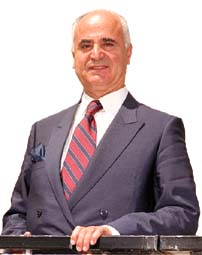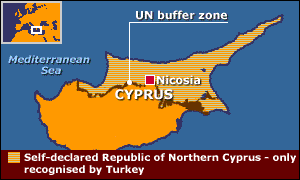16.
August 2000
![]()
2. "Don't let fear prevail", columnist Gungor Mengi writes on the Turkish-EU relations.
3. "Ignorant European Parlamentarians", columnist Ozgen Acar writes on the recent EP report on Caucasian relations.
4. "Post-Saddam bargaining in Ankara", on one hand, Turkey is acting as if it does not want anything. On the other hand, it engages in bargaining for the post-Saddam period. Talabani has urged Ankara to be realistic, saying: There is no way you can remain neutral.
5. "EU terrorism list tops Cakmakoglu's agenda in Germany", Defence Minister Sabahattin Cakmakoglu told his German counterpart, Rudolf Scharping, that Turkey was upset about an EU list of terrorist groups, which had excluded certain Turkish-based organizations.
6. "Spokesman welcomes Turkish stand on Cyprus EU entry", Government Spokesman Mikhalis Papapetrou has welcomed remarks by Turkish foreign minister that Ankara has for the first time acknowledged the European Union decision to accept Cyprus in its ranks, with or without a political settlement.
1. - AFP - "Lawyers of Kurdish leader risk up to seven years in jail":
ISTANBUL / March 6 
A Turkish state security court on Wednesday began hearing a case
against lawyers of jailed Kurdish rebel leader Abdullah Ocalan, who
stand accused of aiding his outlawed Kurdistan Workers' Party (PKK),
Anatolia new agency reported.
If convicted, the three defendants could face jail terms of between four years and five months to seven years and five months. The prosecution has charged the lawyers of "aiding a terrorist organization" -- the PKK -- by distributing to the media written statements by Ocalan, whom they visited in the prison island of Imrali, where the rebel leader is the sole inmate.
In some of the statements, Ocalan issued threats of renewed war against Turkey if Ankara did not respond positively to PKK peace bids. The judge adjourned the trial to a later date for procedural reasons. The defendants include Aysel Tugluk, Mahmut Sakar and Irfan Dundar, who is also the head of the Istanbul branch of the pro-Kurdish People's Democracy Party (HADEP).
Ocalan was sentenced to death for treason and separatism in 1999, but Ankara has suspended the execution of his sentence until the European Court of Human Rights rules on Ocalan's complaints against Turkey. Heeding Ocalan's peace appeals, the PKK said in 1999 that it was ending its armed struggle for Kurdish self-rule in southeastern Turkey to seek a democratic resolution to the Kurdish conflict, which has claimed some 36,500 lives since 1984.
As a result, heavy fighting in the region significantly
diminished, but Turkey continues to hunt down the militants, whom it
sees as "terrorists." ![]()
2. - Sabah - "Don't let fear prevail":
Columnist Gungor Mengi writes on the Turkish-EU relations.
There are only six weeks now for Turkey to fulfill her short-term commitments to the EU. Everything is up in the air right now. Those promises which also appear in the National Programme will be kept through the enactment of amendments to 64 articles of 17 laws by Parliament before March 24. No one, including the anti-EU lobby in Turkey and those against Turkey in Europe, deemed it possible that Turkey would reach such a point.
However, the working through this calendar, albeit with difficulty, alarmed the opposing fronts whose aims were one and the same, and consequently provocations aimed at derailing the process came one after another. As this activity was going on, the Motherland Party's (ANAP) initiative for the complete abolition of the death penalty was a mistake. In Foreign Minister Ismail Cem's words, it led to a nonsensical dispute which damaged Turkey's path. Politics is the art of doing what is feasible. The Nationalist Action Party's (MHP) stance obstructed Turkey's ability to act more quickly.
Yesterday MHP leader Bahceli stated that discussions over the abolition of death penalty, education and broadcasting in Kurdish and the efforts to provide a political groundwork for the PKK were being conflated. Would not carrying out these policies snatch the initiative away from the PKK? However, at present there are no grounds under which the issues can be discussed calmly and with common sense. Therefore, the government must be satisfied with the amendment to the Constitution effectively abolishing the death penalty except during times of war, close combat or terrorism.
However, it must manage to reach an agreement over the
granting of freedom to TV and radio broadcasting in native tongues and
over opening courses to teach Kurdish. Turkey should not permit a defeated,
decimated PKK to stand in its way. Those who know that our EU membership
goal is stronger and more precious than our fears may be grieved or
they may be subject to slanders.No difficulty or sacrifice should deter
those believing in this casue." ![]()
3. - Cumhurriyet - "Ignorant European Parlamentarians":
7 March
Columnist Ozgen Acar writes on the recent EP report on Caucasian relations.
I believe for certain that the European Parliamentarians who voted in favor of the decision regarding the so-called Armenian genocide are either ignorant or acting deliberately. It is obvious that to bring up the old tragic incidents, which occurred during a war, a century ago can't possibly do any good for Turkish-Armenian-Azerbaijan relations.
What is the purpose in reiterating this decision once accepted in 1987, and to whom does it serve? Aren't the European parliamentarians aware of today's facts? The European Parliament didn't take any decision regarding Armenia's occupation of 20% of Azerbaijan's territory, forcing tens of thousands of Azerbaijanis off their land. Instead of digging up old historical wounds, why aren't they concerned with the present-day drama?
They are insensitive to those facts. They may think that 20% of the land may not be enough for Armenia, so it should acquire more. In fact we cannot understand why the US imposed an embargo against Azerbaijan while Armenia in fact was the occupying power. However, despite the efforts of the Armenian lobby, the US government is lifting the embargo. Independent republics formed following the disintegration of the Soviet Union had given each political note that the former borders were valid for them too.
The border between Turkey and the USSR was drawn up by the Moscow and Ardahan agreements in 1921. Yerevan did not give such a note to Turkey, which was one of the first countries to recognize its independence. Why are the EP members ignoring the facts of the present day? The US and certain EU countries are launching initiatives in Ankara for the lifting of the embargo and blockade of Armenia, and for the opening of the railways and border gates in order that the poor Armenians should not starve.
As if Turkey had implemented an embargo or a blockade
against the 'poor' state which has occupied 20% of one of its neighbors'
territories and covets the lands of the other, as if Armenian airplanes
do not land at Istanbul's Ataturk Airport four times a week, as if Armenians
do not benefit from the same facility recognized a US citizen by paying
for their visas at the border. Furthermore, they fly through Turkey's
airspace in line with the Chicago Agreement, and 60% of the goods in
Yerevan markets are of Turkish origin. ![]()
4. - Hurriyet - "Post-Saddam bargaining in Ankara":
Mehmet Ali Birand / 7 March
* On one hand, Turkey is acting as if it does not want anything.
On the other hand, it engages in bargaining for the post-Saddam period.
Talabani has urged Ankara to be realistic, saying: There is no way you
can remain neutral. So come and let us make room for the Turcomans as
well, as early as today
Initially, the Turkish officials said, speaking in a loud voice, "We have warned the United States. There should be no intervention. Iraq must not be split up." Four months later, these statements have not made way, amid crocodile tears, for a bargaining process for the post-Saddam period.
The talks, being held behind closed doors with Patriotic Union of Kurdistan (PUK) leader Talabani, basically involve the new Iraq to be founded in the post-Saddam period.
Who can come to power? Who should be supported?
What kind of coalition should be shaped?
What kind of place should the Turcomans be assigned?
Naturally, there are also the "Would Iraq be split up? What would happen if it did?" kinds of questions. However, the "splitting up" and "establishment of a Kurdish state" assumptions in Ankara are gradually losing ground.
Ankara is increasingly preparing itself for the following line of thinking: Saddam will be toppled; no independent Kurdish state can be set up in Northern Iraq; and we must prepare ourselves for the post-Saddam era.
In other words, Ankara is coming to terms with the fact that it cannot possibly remain neutral in the face of a potential U.S. intervention in Iraq, that it will get involved in that affair even if it does not want to.
The Foreign Ministry and the General Staff reached that point a long time ago. The political mechanism is grasping this more slowly, and they have not "digested" this yet. They are still suspicious and worried.
The boat has already been missed.
The only thing one can do is pray to God that the Bush Administration will not carry this too far, that it will plan well the intervention and its aftermath. That is all...
This mood became more easily discernible, especially during Talabani's visit to Ankara.
Talabani and his team are extremely realistic.
They are saying, "Let us be realistic. Let us stop resisting. Let us discuss the Iraq of the future..."
We have not exactly reached that point yet.
However, you will see that soon that too will happen.
The Kurds too want to be able to see their path
I have spoken both with Talabani and the Turkish officials.
The picture that appeared was extremely interesting.
As far as I was told, Talabani visited Ankara especially at the instigation of the military. He was invited with the aim of sounding him out because the Turkish side feels that the potential intervention is drawing close. Talabani was more than willing to come, and the visit took place.
Both sides say that in this manner they are, at the same time, sending a message to Barzani. These days, for some reason relations between Barzani and Turkey are not warm at all.
Let us take a look at this visit.
Ankara has amply reiterated its age-old warnings, which have become a "Turkish classic."
I think that the messages given by Talabani and his team, were more interesting.
It turns out that the Kurds of Northern Iraq came to Ankara not to discuss today, but tomorrow. They are curious to know whether it would be possible to reach an agreement for the aftermath of the American intervention. They asked the following question to whomever they met with, except government officials: What does Ankara have in mind for the post-Saddam period?
Turkey seems to be reluctant to have this issue discussed in very clear terms. Does it think that if one does not talk about it, the possibility of an intervention in Iraq will disappear automatically?
Meanwhile, it has become apparent that, for the first time, Talabani and Barzani have adopted a joint stance regarding the potential U.S. intervention.
The Kurds are obviously prepared to give Washington support, provided that the United States consults them about the nature of the new Iraq to be shaped in the aftermath of the intervention, but if Washington fails to share with the Kurds anything about the future, it must not expect help from them.
Curiously, Talabani said:
"In Iraq, we do not want to be faced with something like the Karzai phenomenon in Afghanistan."
They fear that Saddam will be replaced by another dictator. To prevent that, they are planning to grab a place for themselves in the new regime to be established in Baghdad.
To sum up, everybody is vying for a share, for a bit of the action that will be available in the new situation that will arise in the post-Saddam period.
Despite all the swashbuckling, everybody is focusing on America to hear what it has got to say.
Ankara is increasingly throwing its weight behind the Turcomans. It is getting prepared to ensure the status of the Turcomans in the post-Saddam period. If an intervention is going to take place, and Turkey will be plunged into it, Turkey intends to ensure that at least the aftermath of it will benefit the Turcomans.
At least this is what we can judge from the outside.
The game of chess has started. ![]()
5. - Turkish Daily News - "EU terrorism list tops Cakmakoglu's agenda in Germany":
March 6
Defence Minister Sabahattin Cakmakoglu told his German counterpart,
Rudolf Scharping, that Turkey was upset about an EU list of terrorist
groups, which had excluded certain Turkish-based organizations.
Cakmakoglu, in Berlin for a meeting on relations between NATO and the Ukraine, met Scharping yesterday. The pair also discussed the possible Turkish command of an international peacekeeping force in Afghanistan, and defence ties between the two NATO-member countries.
"I asked about the German stance on this list and expressed our regret that it excluded (Turkish) terrorist organizations," the Anatolia news agency quoted him as saying after the meeting.
The European Union issued the list in December, drawing Turkish criticism for not mentioning armed militant groups, such as the outlawed Kurdistan Workers Party (PKK) and the Revolutionary People's Liberation Party-Front (DHKP-C). Those groups are active in some European countries under different banners.
Cakmakoglu said that he had exchanged views with the German
defence minister about the current situation in Afghanistan, and had
repeated the Turkish need for clarification of the mandate and the funding
of the peace keeping force there. He is expected to return home today.
![]()
6. "BBC Monitoring Service - "Spokesman welcomes Turkish stand on Cyprus EU entry":
text of report in English by Greek Cypriot news agency CAN
Nicosia / 6 March
Government Spokesman Mikhalis Papapetrou has welcomed remarks by
Turkish foreign minister that Ankara has for the first time acknowledged
the European Union decision to accept Cyprus in its ranks, with or without
a political settlement. The spokesman also said that the government
has been informed that there is nothing that could block the country's
accession, a view that Turkey seems to have finally understood.
Papapetrou was commenting on statements by Turkish Foreign Minister Ismail Cem to CNN Turk that when the time approaches for Cyprus to join the EU, Turkey will remind European politicians of the Helsinki conclusions regarding Cyprus. He also said that Turkey intends to remind them that the "initiative" for the resumption of the direct talks "belongs" to Turkish Cypriot leader Rauf Denktas.
The EU decided in Helsinki in December 1999 that a Cyprus settlement would facilitate accession but it is not a precondition for accession. It also said that at the time it would take all relevant factors into consideration.
"I would like to welcome the fact that for the first time a Turkish official interprets the Helsinki conclusions the same way as the Cypriot and the Greek sides have done from the very beginning," Papapetrou said, when invited to comment on Cem's remarks. He pointed out that this interpretation had been rejected in the past by Turkey. Papapetrou described the Helsinki decision as a political message to the Greek and the Turkish Cypriot sides "to think about their stance and positions at the negotiating table".
Papapetrou said the Greek Cypriot side has acknowledged this message and is behaving in such a way that leaves no doubt to anyone about its intentions at the ongoing direct talks, which began in mid January. He expressed hope that Denktas has also acknowledged this same message and added that if this happens, then the Cyprus problem will certainly be solved.
Cyprus opened accession negotiations with the EU in 1998
and has so far provisionally closed 24 out of 29 chapters of the acquis
communautaire. It has been divided since 1974, when Turkish troops invaded
and occupied 37 per cent of its territory. ![]()